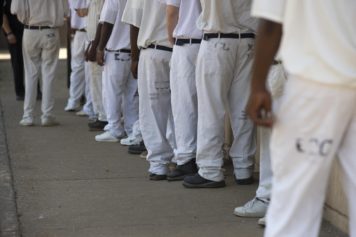
America’s mass incarceration problem is not such a big problem at all for the correctional facilities that house the convicted. In fact, it’s a significant source of revenue for state corrections departments across the country and the private corporations they do business with, and a new report by the Prison Policy Initiative suggests local jails have joined in on the money making scheme.
Some state prisons have become so overpopulated that local jails have made a profitable business out of renting out their spaces to them. In Kentucky, more than 45 percent of the beds intended for temporarily detaining individuals awaiting trial are filled with convicted state and federal prisoners. Over in Arkansas, the rate is 40 percent.
“Nationwide, 12 percent of the local jail population is actually there under contract with state or federal authorities,” the report read.
The Massachusetts criminal justice think tank analyzed data from the Bureau of Justice Statistics’ Mortality in Local Jails and State Prisons Series and National Prisoners Statistics Series to calculate the figures.
“We knew that people incarcerated at the state and federal level were counted in local jail data and when we parsed some of that out we realized that this was much bigger problem that we had initially thought,” Peter Wagner, executive director of the Prison Policy Initiative told the Intercept.
But the biggest offender in the nation was by far Louisiana, where more than three-quarters of parish jails are full of state prison inmates. Not a big surprise, as the state has been dubbed the world’s ‘Prison Capital.’ Back in 2012, the Times-Picayune’s award-winning expose shed light on how the state earned its dubious title.
Apparently local sheriffs and wardens stand to make a lot of money by keeping the prisons at maximum capacity and regularly trade inmates between districts to keep facilities full. Some Louisiana wardens spend the better part of the work day making calls to other centers in hopes of acquiring leftover inmates.
According to the Times-Picayune, each inmate is worth $24.39 a day in state money.
The PPI reports this system is not unique to Louisiana. Local sheriffs in Oklahoma make $27 per day, per state inmate and Mississippi state inmates garner $29.74 per day.
Mississippi isn’t too far behind Louisiana, 55 percent of its county jail cots are occupied by state detainees. But Mississippi takes it one step further by forcing local jails to only accept prisoners who will work for free.
The Huffington Post covered the predicament Mississippi law enforcement officials are facing, as prison reforms have led to dwindling jail populations and in turn, shrinking revenue.
Money has become so scarce that legislators are relying on free prison labor to save their increasingly tight budgets and appease taxpayers.
“You’re either gonna go up on everybody’s garbage bill, or you’ve gotta house those inmates,” George County Supervisor Henry Cochran told the Post.
“You’re using that inmate labor, so [taxpayers are] getting a little good out of that inmate for their tax dollars. You either gotta hire a bunch of employees or keep that inmate. It’s like making a deal with the devil,” Cochran added.
In the end, incarcerated felons suffer the most. Unlike larger federal institutions, local jails lack the appropriate resources to rehabilitate inmates, making them more likely to reoffend upon release and end up right back where they started.


